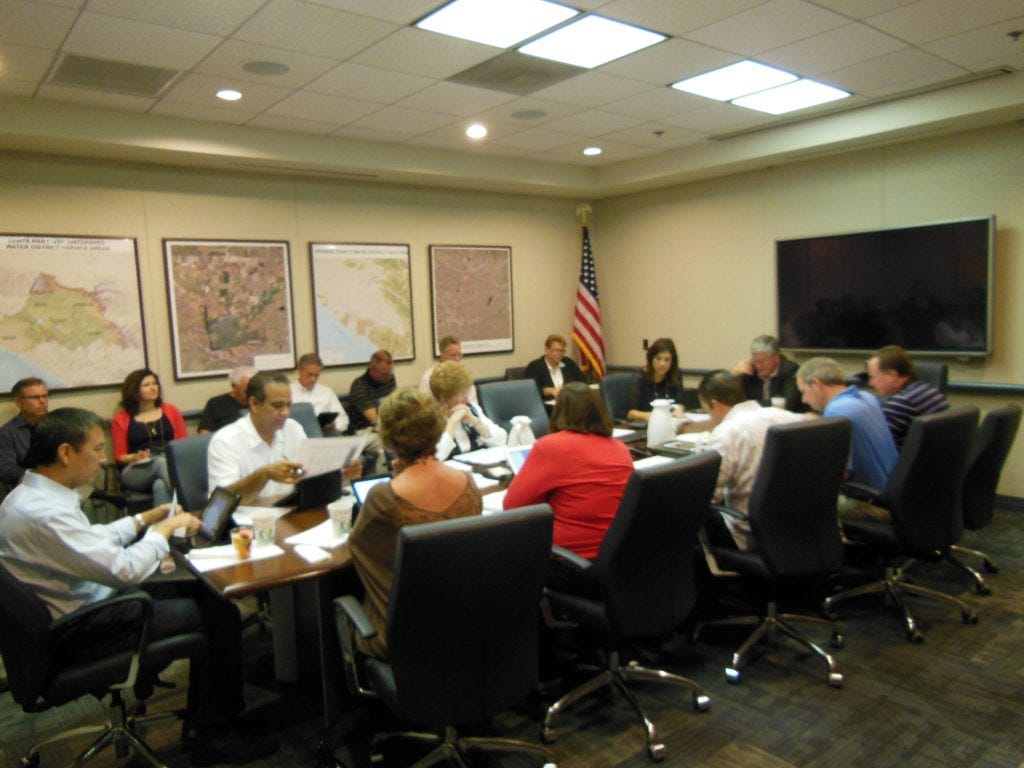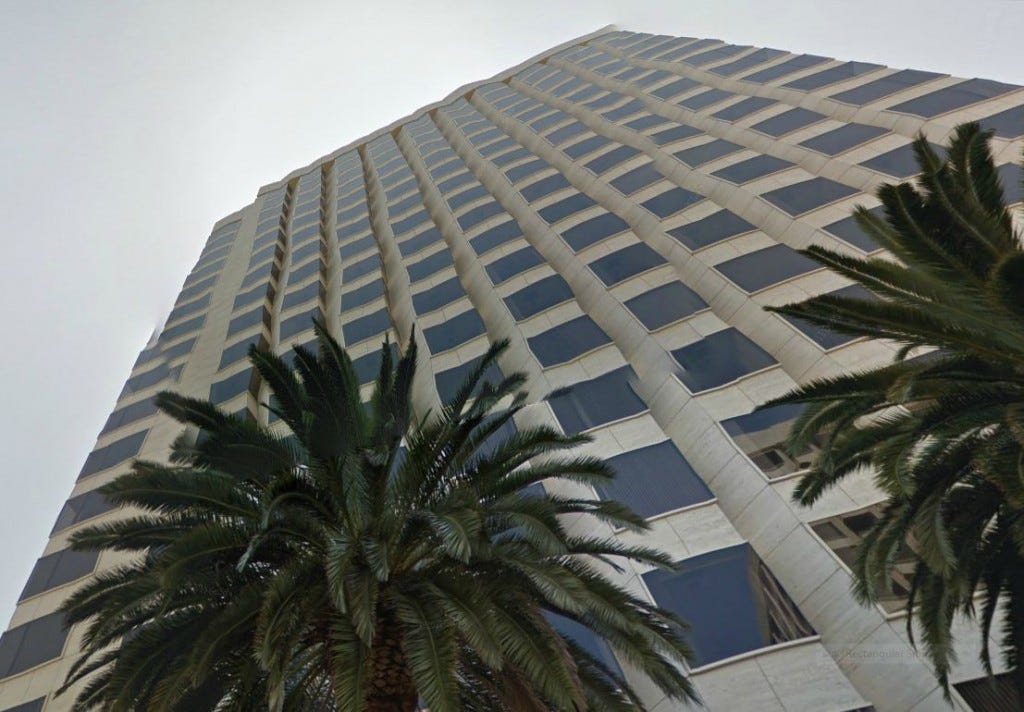Ever Been to Your Local Water Board Meeting? Beware of What You're Missing!
'When we don't participate we act blindly and get the government we deserve.'
By Debbie Cook
Editor’s note: Debbie Cook is a former Huntington Beach City Council member (2000-2008) and two-term mayor of that city. She served on California’s State Desalination Task Force in 2003 and as a city official voted against the ocean desalination plant proposed by Poseidon Resources Inc. Cook has been monitoring government transparency at local water districts for 12 years and has contributed to SoCalWaterWars (formerly Surf City Voice) in the past.
The word transparent is often used to describe clean water, but I have never heard it used to describe the water districts that manage our water systems, except by the districts themselves.

The description you would more likely hear is, self-serving, rude, unethical, corrupted, toxic.
Consider the first time I attended the Mesa Water District of Costa Mesa, for example (by clicking this link), and was illegally interrupted during public comments by the board chairman while explaining the illegality of their proposed new public records policy.
Then, during the board’s donut break, I was mocked and insulted by the board secretary and directors over a hot mic used for recording meetings. Here’s a short snippet that summed up the board’s attitude toward the public:
Secretary: (sarcastically) I don’t care what the city of Huntington Beach does, but thanks for letting us know.
Chairman: (laughing) What they did when you were on the board, which you are no longer.
Secretary: Right, she is not on the council anymore.
Chairman: No, she’s not on the council.
Secretary: Beat it!
There are over 52,000 public and private water utilities in the U.S. alone operating largely in anonymity. Public utilities offer varying levels of transparency, private utilities virtually none.
After 15 years of scrutinizing local water agencies, I am troubled by the things that I have witnessed. Below are some random samples with attached links to news stories where possible:
A GM who hires his wife and moonlights for other agencies.
Failing to live up to fiduciary responsibilities, holding illegal closed sessions
Illegal secret meetings (closed to the public) about a $1.4 billion project—disguised as ad hoc meetings—away from public view.
Illegal closed sessions promoted by a private water company in search of lucrative contracts.
Adding last minute items to agendas, illegally, while pushing a potentially shady insider land sale.
Failure to notice public meetings properly and other Brown Act violations
Holding public meetings at the convenience of water board directors, not the public.
Misusing committee meetings and mocking public attempts to bring transparency to water board meetings.
Trying to hold an illegal closed meeting offsite (in a corporate-office penthouse) to be schmoozed by a law firm seeking a legal-counseling contract with the water district.
Board members who openly loathe being watched or criticized by constituents who are advocating for greater transparency.

Making a recommendation in committee to table even though there is no such motion in the Orange County Water District lexicon. Photo: Documents that aren’t available online.
Being told that appointments would be necessary to review meeting minutes
Board members suggesting that some public documents should not be public.
Board members who regularly come late (often very late) and leave early or regularly fall asleep at meetings but still get paid their meeting stipends and perks.
Refusal to televise or livestream meetings, then misusing public meetings
A board president who didn’t report his wife’s income (she was a consultant for two water agencies he represented (Metropolitan Water District of Southern California—as board president, and the Municipal Water District of Orange County, the agency that appointed him to the MET board).
Staff who get a tongue lashing for delivering truth.
Misuse of public funds
Understating the true cost of ocean desalination
Overstating future water demand when past data proves otherwise
Misleading government regulatory agencies
Studies show that even those people who run for public office because they wanted to advance a public good, are likely to become corrupted when they feel like they have obtained a position of privilege.
I’ve witnessed the corrupting forces of officials while serving eight years on the Huntington Beach City Council and six years on the Regional Council of the Southern California Association of Governments.

Corporations like Edison, PG&E, Telecoms, Oil and Gas, private water purveyors, and countless land developers, whose bottom lines are affected by policy decisions, have armies of lobbyists who wine and dine you at various functions, lavish you with fake praise, and cleverly bring you into their “club.” Most elected officials are easy targets.
There is a reason why AT&T spent $7.8 million in 2016 to hire 100 lobbyists to get the Texas Legislature to pass SB 1004. The bill capped how much local government could charge telecoms for using public property.
There is a reason that Poseidon Resources has likely spent millions of dollars to lobby elected officials throughout Orange County and the state for $1.4 billion Huntington Beach ocean desal plant that we don’t need.
The consequences of years of lobbying and corruption of elected officials who abuse their power is how we have found ourselves in this predicament.
But I can’t place the blame entirely on these weak-kneed elected officials. Some of it is OUR fault.
No one attends their meetings, we no longer have a media presence to write about the wrongs, and those who should be enforcing sunshine laws, like the DA or AG, aren’t interested in expending political capital on small fish. Moreover, they don’t have the time like a few local citizens and organizations, to pour over documents and question what is happening behind closed doors.
When we don’t participate, we elect blindly, and we get the government that we deserve.
All of which demonstrates the need for live video streaming and online archiving by all water districts, including post pandemic, something that Padre Dam Municipal Water District’s general manager Allen Carlisle recently asked the district’s board of directors to enact soon.
Most water boards have been video streaming their meetings on Zoon during the pandemic, but few in Southern California did so before the pandemic or would desire to do so after it, unless the public speaks up now.
Video streaming by Padre would follow the modern and more democratic practice of the Metropolitan Water District of Southern California, not to mention every city council in San Diego County for decades.
Turning on the video cameras at Padre board and committee meetings—and archiving them online for easy public access—would be a first for San Diego County water boards and an important step toward local government that really is for the people and by the people.







I reported on the antics of our local school board for over 20 years, first as a columnist for the Daily Pilot (15 years), then through my blog. You can swap "school district" for "water board" and it would read the same. We get the government we deserve.
Go Get'um! Back soon!